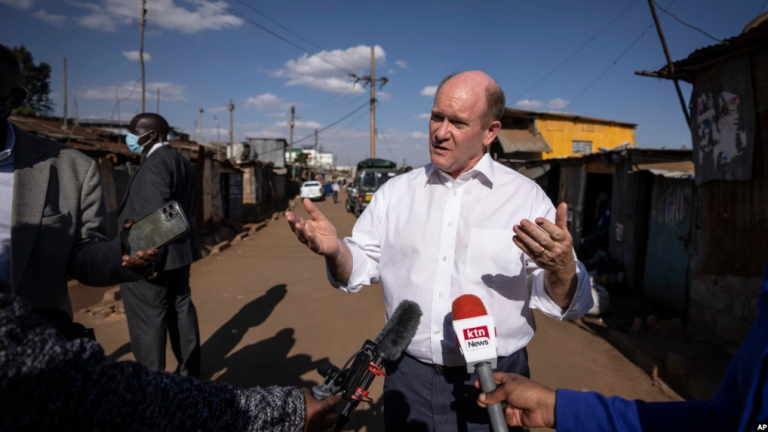

A visiting U.S. senator says he has encouraged Kenya’s outgoing president to participate in a “peaceful transition of power” amid the latest election crisis in East Africa’s most stable democracy.
“I’ll let the president speak for himself, but that was certainly a hope I expressed today,” Sen. Chris Coons told The Associated Press after his meeting with President Uhuru Kenyatta on Thursday. He said they discussed ways in which Kenyatta can play a “constructive peacemaking role” after leaving office.
Kenyatta has remained publicly silent since the Aug. 9 vote, adding to the anxiety as Kenya again faces post-election uncertainty and a likely court challenge by the losing candidate, Raila Odinga. Coons, leading a congressional delegation on a five-country Africa visit, was in Kenya in part to meet the key parties and urge that calm continue.
Kenyatta had backed longtime rival and opposition leader Odinga in the close race against his own deputy president, William Ruto, who fell out bitterly with Kenyatta years ago. Ruto on Monday was declared the winner, but not before Kenya’s most peaceful election ever slid into chaos in the final moments.
The electoral commission split in two, each side accusing the other of trying to tinker with the results. It came as a shock to many Kenyans after an election widely seen as the country’s most transparent ever, with results from the more than 46,000 polling stations posted online.
Now Odinga almost certainly will challenge the results in Supreme Court. His campaign has seven days from Monday’s declaration to do so, and the court will have 14 days to rule. Odinga has urged supporters to remain patient instead of taking to the streets in a country with a history of sometimes deadly post-election violence.
After meeting with Kenyatta, Odinga and Ruto, Coons told the AP “I was encouraged that in all three meetings we heard a commitment to a call for calm and tranquility, to respect the legal processes established in the 2010 constitution.” He said the conversations were about the rule of law, the importance of free and fair elections and peaceful transitions.
“Obviously, the United States has had a very difficult experience with these issues for the past few years,” Coons said, referring to the Jan. 6, 2021, attack on the U.S. Capitol as former President Donald Trump tried to remain in power. “I said in all three meetings we have things to learn from Kenya.”
Kenyatta told Coons that Kenya would uphold “its position of a shining example of democracy in the continent by maintaining peace during this transition period,” according to a statement issued by the president’s office.
Coons said he did not come to Kenya seeking anything like the handshake that Kenyatta and Odinga, after prodding, famously shared to end months of crisis after the 2017 election, whose results were overturned by the Supreme Court over irregularities, a first in Africa. Odinga boycotted the fresh vote and declared himself the “people’s president,” bringing allegations of treason.
This time, with Kenyatta’s backing, the Odinga campaign felt he would win the presidency after a quarter-century of pursuing it.
Kenyatta is stepping down after two terms, itself a notable act in a region where longtime presidents like Yoweri Museveni of Uganda and Paul Kagame of Rwanda have been accused of clinging to power through changes in term limits, manipulation of elections and crackdowns on dissenting voices.
The U.S. delegation is also visiting Rwanda, where human rights and violent tensions with neighboring Congo are almost certainly on the agenda following Secretary of State Antony Blinken’s visit there last week. Coons said he looks forward to visiting again with Kagame.
Kenyatta has played a leading role in efforts to calm the Rwanda-Congo tensions and in trying to mediate in neighboring Ethiopia’s deadly Tigray conflict, with support from the U.S. Coons did not say what kind of peacemaking role he hoped to see Kenyatta play after stepping down.
Ruto’s public comments this week have been on domestic matters, not foreign, but Coons said the president-elect made an “expression of concern and intent in trying to help lead to positive resolutions” in such regional crises.
Coons also has played a role in trying to calm the Ethiopia conflict. But he told the AP the delegation was not having a meeting with Ethiopia’s government or the Tigray forces while in Kenya.
Coons, a member of the Senate Committee on Foreign Relations, and his delegation have already visited Cape Verde and Mozambique and will visit Tunisia as well.
